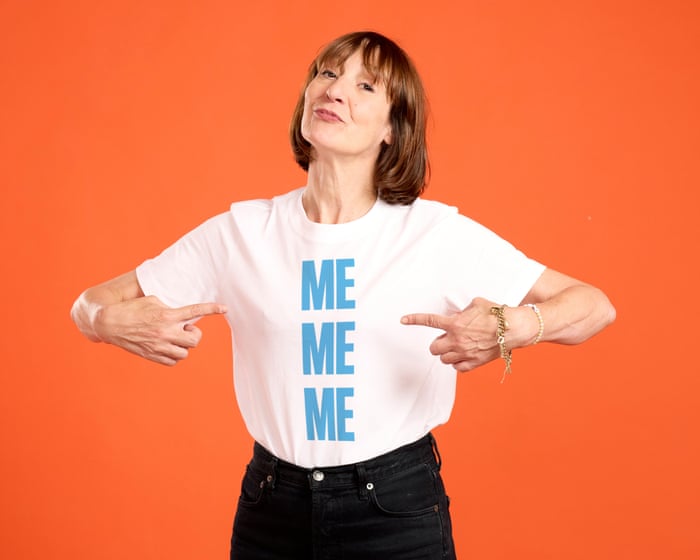“Are you sure you want that one?” asked the assistant at the flagship Waterstones in London’s Piccadilly. I had chosen the classic self-help book Thinking, Fast and Slow by Daniel Kahneman from among a stack of trendier titles like The Let Them Theory, Fawning, The Subtle Art of Not Giving a F*ck, and The Courage to Be Disliked. “Isn’t that the one everyone’s reading?” I inquired. She handed me the cloth-bound Don’t Believe Everything You Think instead. “This is the one everyone’s reading.”
According to Nielsen, self-help book sales in the UK grew annually from 2015 to 2023. That’s only counting overt self-help books, not including “stealth-help” genres like memoirs, nature writing, or bibliotherapy—poems and other works meant to lift your spirits. But the biggest sellers in recent years fall into a specific category: self-help that advocates focusing solely on yourself. Some books advise stopping the effort to please others; others suggest not thinking about them at all. What could I gain from reading them?
Fawning: Why the Need to Please Makes Us Lose Ourselves and How to Find Our Way Back by US psychologist Dr. Ingrid Clayton is the latest in this self-centered self-help subgenre. You’re likely familiar with “fight, flight, or freeze”—the body’s instinctive reactions to danger. Fleeing works well if you encounter a tiger, but it’s less useful in a work meeting. “Fawning” is a newer term in the trauma response vocabulary, which Clayton distinguishes from the familiar concepts of “people-pleasing” and “co-dependency” (though she considers them branches of the same tree). She argues that fawning behavior is often reinforced by societal structures like patriarchy and “white body supremacy,” an attitude that sets whiteness as the standard. So while fawning isn’t your fault, it becomes your problem because it involves suppressing your thoughts, feelings, and needs to appease someone else in the moment.
Clayton’s book is excellent—expert, vulnerable, disarming, and thoughtful. Yet it squarely addresses the central self-help question of our era: “What would you do if you put yourself first in your own life?”
Mel Robbins has sold six million copies of her book The Let Them Theory and boasts 11 million Instagram followers. Her philosophy is not only to prioritize yourself (which she calls “let me”) but also to allow others to do the same (“let them”). For instance, she writes, “Let my family be late to everything we attend,” and “Let the neighbor’s dog bark all day.” There’s an intellectual honesty here, as it prompts readers to consider not just their own selfishness but if everyone acted that way. However, Robbins’ tone is one of “wise up”—everyone else is already letting their dog bark all day. If you don’t adopt the “let them, let me” mindset, you’ll be trapped worrying about others’ negative opinions while they aren’t concerned about yours. This will drain your time, energy, and emotional space, ultimately leaving you without control over your own path. She delivers this message to packed theaters on global tours, with stops in London this year and New Zealand, Australia, and the US next. Robbins has been a lawyer, broadcaster, and podcaster; she’s experienced highs and lows like a character from a Frank Sinatra song. But fundamentally, she’s someone people listen to, whether through her books, Instagram, or live speeches.
I don’t mean to sound like a second-wave feminist, but the male authors in this…The terrain of self-help books is largely the same, but often less intelligent. Mark Manson’s The Subtle Art of Not Giving a Fck: A Counterintuitive Approach to Living a Good Life* frames the issue a bit differently: seeking others’ approval is just one of several fallacies—along with chasing happiness, embracing “victimhood chic,” and the “responsibility/fault fallacy”—that stand between you and your goal of not caring. Manson began by blogging dating advice in 2008 before expanding to advice on everything.
The “Let Them” theory suggests not only that you should prioritize yourself, but also that you must allow others to do the same.
Ichiro Kishimi and Fumitake Koga’s The Courage to Be Disliked—which has sold 10 million copies and claims it “can change your life”—is written as a dialogue between a prominent Japanese philosopher and psychologist (Kishimi) and a young person (Koga, who is 52, but let’s call him a youth anyway). It argues that Freud was wrong and his contemporary Alfred Adler was right: the past doesn’t matter; only your goals do. Freud focused on causes, while Adler explained behavior in terms of its purpose. From this perspective, all problems become interpersonal issues (which might be true unless your problem is something like your local food bank flooding, leaving you with nothing to feed your baby—though I suppose the baby is still a person, so fine). Therefore, being disliked by others is seen as proof that you are exercising your freedom.
Joseph Nguyen’s 2022 book Don’t Believe Everything You Think: Why Your Thinking Is the Beginning and End of Suffering is a global bestseller. He makes a similar argument, drawing on wisdom from Zen monks (who are more a collection of parables than actual monks), stating that negative emotions come not from circumstances or past events, but from how we think about them. His solution is even simpler: stop thinking. I’m not joking. By chapter 7, he offers “Practical steps for how to stop thinking”: pause and take a breath; ask if your thoughts are leading you in a good direction; realize you can choose to stop thinking; repeat a mantra like “thinking is the root cause of suffering” or “stop thinking, idiot”; and finally, experience the feeling without attaching thoughts. These steps—pause, ask, understand, say, and experience—spell PAUSE. Clever.
These radical self-reliance books range from smart and well-researched to less so. They all share a tone of confidence, but what self-help book doesn’t? One thing is clear: they’re meeting a deep need in a world eager for guidance. People are looking for permission to live their best, Ayn Rand-style life, where personal happiness is the ultimate moral goal. Anyone who can convincingly grant that permission—well, I won’t speculate on their fulfillment, but they’re certainly making money (though opinions vary on wealth’s role in a meaningful life).
Laurie Santos, a psychology professor at Yale, expressed some skepticism in an email about the idea that self-reliance leads to well-being. “Study after study shows the opposite,” she said. “We often think focusing on ourselves will make us happiest, but one of the most reliable ways to boost happiness is by focusing on others. I tell my students that ‘self-care’ is a misnomer. Shifting our attention to others improves our mood and gives us a sense of purpose.” Santos cites research from Harvard Business School showing that “spending money on others makes us happier than spending it on ourselves. This effect has been replicated across…”Across cultures and income levels, the happiness gained from giving appears universal and deeply rooted in human nature.
Discussions about setting boundaries—and the resulting mindset of not caring and being disliked—often overlook money. Clayton observes how people who constantly please others can deplete themselves financially, citing a client who gave away 82% of her disposable income. However, most stories about successful boundaries focus on emotional challenges—such as dealing with a neglectful family, a critical boss, or a self-centered partner. The key lesson in adopting a “let them” or “forget them” attitude is to stop prioritizing what doesn’t fulfill you. Generosity isn’t weighed and deemed unimportant; it simply doesn’t come into play.
Santos notes, “Research consistently shows that social connections are crucial for happiness,” referencing a 2002 study that found social ties essential for true life satisfaction. She expresses concern that individualistic, self-reliant approaches might overlook this. Robbins, who is highly active on social media, has faced criticism on this point and clarifies in her book that feeling lonely after applying the “Let Them Theory” means it’s being misused. The theory isn’t an excuse to ignore people who annoy you but a call to take charge of your desires. If you end up lonely, it suggests you haven’t taken enough responsibility for what you truly want.
What self-reliance theories often miss is that social connection frequently begins with actions we’d rather avoid, like venturing out in bad weather. The emphasis on comfort, evident in trends like the 2016 “hygge” craze celebrating cozy solitude, has been challenged by rising loneliness. Building community, like making history, requires showing up.
Self-reliance draws from Taoist and Indian religious traditions, whether through a shaman in Clayton’s account, Zen monks in Nguyen’s anti-thinking approach, or the Buddha, whom Manson describes as not caring from a philosophical standpoint. This isn’t a new idea. Eco-philosopher Rupert Read points out that religions have often been used to promote resignation. When removed from their cultural context, they can be twisted into something contrary to their original purpose. Eastern cultures typically emphasize communal living, and without that foundation, practices like meditation can become tools for individual self-improvement, whether in personal growth or business.
Ultimately, as psychotherapist Manu Bazzano, trained in Adlerian psychology, suggests, a person’s mental health can be measured by their interest in others.A Zen priest once noted, “Interestingly, in Zen practice, a positive inner experience arises when we begin acting for others—when we open ourselves to their suffering and distress, and in doing so, ease our own obsessive self-concern.”
So, what is the ultimate outcome of having the “courage to be disliked”? Essentially, you reach a point where you care so little about others—their opinions, feelings, and perspectives—that you no longer dwell on the past. Kishimi and Koga reference Adler in their book, stating, “Trauma does not exist… no experience is inherently the cause of our success or failure.” They emphasize, “The self is determined not by our experiences themselves, but by the meaning we assign to them.” This aligns with Nguyen’s ideas, and it’s accurate that Adler did express this. However, some context is missing: Adler was intensely goal-focused but also served as a left-leaning, socialist counterbalance to Freud, as Bazzano points out. Adler even coined the term “gemeinschaftsgefühl” to describe a sense of community and belonging, and he would likely be dismayed to be portrayed as the originator of the “courage to be disliked.” While Kishimi and Koga’s book does touch on finding purpose through helping others, it does so in a way that overlooks others’ viewpoints—akin to assisting an elderly person across the street without confirming if that’s what they wanted. She might resent it.
Reading too much of this material—which I certainly have—can make it sound somewhat Trump-esque. Bazzano clarifies, “It boils down to this: the measure of a person’s mental health is their level of interest in others, whether neighbors or broader social and political issues.”
Ah, politics. With the exception of Clayton, who deeply examines the structural forces behind our collective people-pleasing tendencies, the other authors encourage you to endure whatever political circumstances you face. They often begin with personal stories of detachment from materialism—sharing past struggles like being $800,000 in debt (Robbins) or selling everything to move to South America (Manson). It sounds rough, doesn’t it? Yet Manson writes, “We are often actually happier with less.” Anti-consumerism is a common theme on the left, tied to anti-capitalism, but in self-help guides, it takes on a tone of “stop complaining; there are no victims.” Overindulging in this mindset—as I have—can make it resemble Trump’s rhetoric (e.g., “maybe the children will have two dolls instead of 30”). In a way, it’s clear: if you’re solely focused on yourself, political organizing is the last thing on your mind, and if you’re not organizing, you must accept your current reality.
Santos observes, “Overall, we have a bias toward what Nicholas Epley calls ‘undersociality’—we underestimate how rewarding all forms of connection with others can be.” So, before fully committing to self-reliance, have you considered caring and being liked?
Frequently Asked Questions
Of course Here is a list of FAQs about the trend of put yourself first selfhelp books designed to sound like questions from a real person with clear and direct answers
Understanding the Concept
1 What does put yourself first actually mean
It means prioritizing your own wellbeing needs and goals so that you can show up as a healthier happier and more capable person for others and yourself Its not about being selfish but about selfcare
2 How is putting yourself first different from being selfish
Selfishness is about pursuing your own interests at the expense of others Putting yourself first is about ensuring your own cup is full so you have the energy and capacity to help others without burning out
3 Are these books just a trendy fad or is there real value in them
While the trend is popular the core principles are timeless and psychologically sound The value depends on whether you apply the advice to your life
Benefits and Effectiveness
4 What are the main benefits I can expect from reading these books
Common benefits include reduced stress and anxiety increased selfconfidence improved decisionmaking healthier relationships and a stronger sense of purpose
5 Can a book really change my life
A book alone cant change your life but it can provide the knowledge perspective and practical tools you need The real change happens when you take consistent action based on what you learn
6 Im a peoplepleaser Can these books actually help me stop
Yes absolutely Many of these books specifically address peoplepleasing by teaching you how to set firm boundaries say no without guilt and validate your own needs
Common Concerns and Challenges
7 I feel guilty when I try to put myself first Is that normal
Yes its very common especially if youre used to prioritizing everyone else The guilt usually fades as you experience the positive results and realize that taking care of yourself benefits everyone around you too
8 What if my family or friends dont support this new mindset
This is a common challenge These books often provide strategies for communicating your new boundaries with love and firmness Sometimes relationships evolve and you may find yourself gravitating toward people who support your growth



